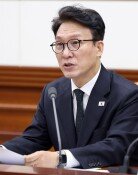Rotten National Assembly
The Commission on Peoples Rights and Interests conducted a survey of ordinary people, public officials and foreigners on the perception of corruption in Korea. The study found that 56.6 percent named political parties and the legislature as the two most problematic areas for corruption. In a survey on credibility conducted by the polling company Realmeter, the National Assembly received the lowest mark among nine major organizations with 2.33 points out of five.
The lobbying scandal involving the National Private Security Guards Friendship Council also intensified public distrust of parliament and politicians. An investigation found that lawmakers took political funds to enact laws, so the ruling and opposition parties attempted to enact a law banning political funds for lawmakers regardless of the moneys nature but failed. Worse, both sides furtively passed a law on giving former lawmakers aged over 65 a lifelong monthly pension of 1.2 million won (1,037 U.S. dollars) each. Amid physical brawls over the passage of the national budget bill, lawmakers of both the ruling and opposition parties joined hands to raise their monthly pension 5.1 percent. This also angered the working class. A repeat of violence in the National Assembly also fueled public distrust of parliament.
Quite a few influential ruling and opposition party lawmakers and those at a parliamentary budget subcommittee have competed to reflect projects related to their constituencies and those of their fellow lawmakers in the budget bill. Their intent is reelection to the Assembly in the next general elections, so the lawmakers seek to advance their private interests under the guise of seeking the public interest. Opposition lawmakers are no exception. This is why the people are giving the cold shoulder to main opposition Democratic Party lawmakers who are staging rallies nationwide and outdoor protests against the railroading of the budget bill by the ruling party.
Compared to this years budget, the Democratic Party claimed that the money earmarked for welfare was cut 2.8 trillion won (2.4 billion dollars) in at least 120 projects. The welfare budget that passed the Assembly, however, was 121.4 billion won (104.9 million dollars) higher from the initial amount of 86.4 trillion won (74.7 billion dollars). The share of welfare in the national budget is 28 percent, the highest in history. The Democratic Party either failed to reflect the increase in the standing committee or blindly considered budgets that decreased from those for this year as a reduction.
Also regrettable is the internal division within the ruling Grand National Party in the wake of the bills passage. It has neither courage nor ability and makes no effort to persuade the people about the fiscal principle of rational allocation of limited budget and the basic direction of the administration.







